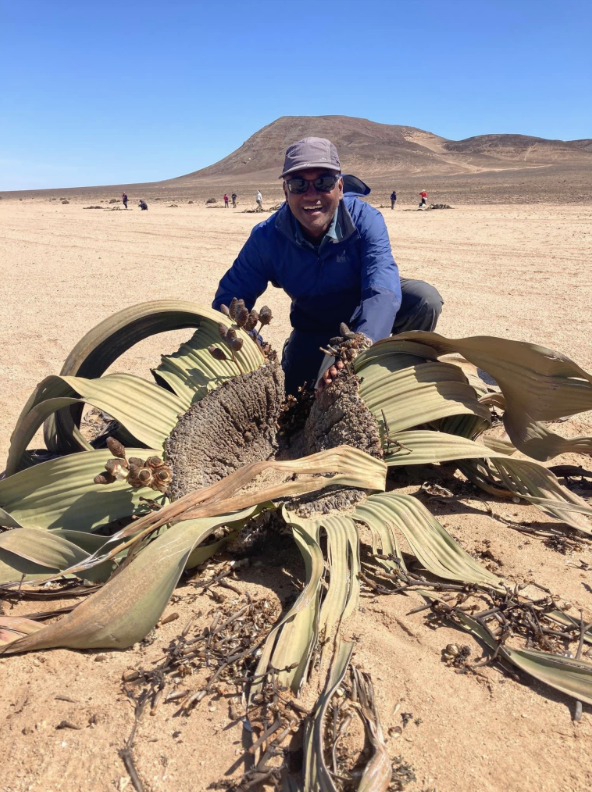Nishanta ‘Nishi’ Rajakaruna with Welwitschia mirabilis subspecies namibiana in the Namib Desert
Source: Fulbright
"The future belongs to those who dare to step into discomfort and welcome the unknown — and those are the ones who become Fulbrighters.”
- Nishi
When you call Nishanta “Nishi” Rajakaruna on the phone, his energy is infectious. You could easily forget you were speaking to a full professor at Cal Poly, and the only sign that you are speaking to someone in the hard sciences comes from the sunlit warmth of this botanist’s personality. His energy is not just reserved for Fulbright Program staff but offered to anyone who wants to talk about Fulbright with him.
In the last year, Nishi has advised eleven Fulbright applicants, and the way he starts these advising conversations is also the way he recommends that applicants reach out to potential hosts abroad. “I ask them a bit about their personal and professional background and about their research and teaching interests. Then I ask them if there are people abroad whose work they’ve found interesting and how that work relates to their own.” He reminds us, “As academics, we read literature, so we know where research is happening in our respective fields.” There is nothing more flattering than reaching out to someone on the basis of their exciting work, proving that you have taken the time to already get to know them.
For his entire academic career, Nishi has followed the path of “where exciting botanical education and research is happening.” In the 1990s, Nishi came from his native Sri Lanka to pursue his undergraduate education in the United States at the College of the Atlantic. After graduate school at the University of British Columbia in Canada and postdoctoral research at Stanford University, he returned to his undergraduate institution for his first tenure-track job and happened to fall into the perfect environment to become a Fulbrighter. The College of the Atlantic is unique in that the institution does not have departments, and this organizational structure helped Nishi begin to break down his disciplinary and networking barriers. He shares, “When I decided to apply, I spoke to the two faculty members who had just received a Fulbright. One was a physicist, one was an anthropologist, and I was a botanist. They were completely outside of my field!” While Nishi could only talk to these colleagues about the application process and not about his specific project, the lessons he learned from these conversations were perhaps more valuable. He muses, “Some people are more open to feeling uncomfortable” talking across disciplinary lines, “and I think those are the Fulbrighters – people who like to be challenged, people who realize that a contradiction about the way they see the world is actually a moment of learning.”
Nishi encourages people to take what may seem to be an uncomfortable step of reaching across disciplinary lines to learn about Fulbright, but he also recommends doing things that are already comfortable. Though Nishi’s first Fulbright saw him return to his native Sri Lanka after he became a U.S. citizen, his second Fulbright to South Africa required more networking and, he quips, “It happened in a hotel!” During Nishi’s time as a graduate student at the University of British Columbia, his advisor offered him some soon-to-expire funding to go to an international conference. When Nishi’s abstract, based on his Master’s thesis, was accepted to the conference, he arrived at the conference hotel and shared a room with a South African graduate student. “We shared the same room for a week, and we started talking about mutual interests in addition to our research. Both of our home countries love cricket and rugby, and we bonded through the shared interest in sports” and stayed in touch. Through the network of this conference roommate, Nishi found himself in South Africa for his second Fulbright 23 years later, in the 2022-2023 academic year. The moral of this story, Nishi says, is “when you go to conference, don’t just hang out with your friends. Make new friends because you never know how connections you make in settings you wouldn’t even imagine possible play out and shape your life 20 years later.” You can use events you are already attending to form connections that last a lifetime.
To bring his themes full circle, Nishi’s best advice for writing an email to find a Fulbright host combines his strategies of daring for the uncomfortable and cultivating the comfortable. When Nishi writes a networking email, “The first thing I bring up is that ‘I just read your paper, and I’m really excited to see what you’ve done,’” starting with shared territory to break the ice. He encourages Fulbright Scholar applicants to remember that “We academics like when our work is being celebrated by someone.” He recommends leading with this sincere, academic connection: “Talk to them about the work they’re doing before you start talking about what you do.” From there, he recommends that applicants move to a video or phone call and “immediately connect [the host’s] research skills and experiences to what they’re doing and find ways to show that you would both benefit from working together on a particular project.”
He hits it right on the nose that this networking strategy, which applies well beyond Fulbright, also prepares applicants to successfully be selected for the Fulbright Scholar Program. “It’s hard for academics because we are trained to write these very rigorous, hypothesis-driven research proposals. But we must remember that Fulbright is not only about rigorous research and teaching...but also about cultural and educational exchange to foster a better world. I try to get people to think about the core value of Fulbright from the very beginning” and let that guide their conversations, their application, and their grant project.
Fulbright Scholar applicants should feel empowered to embrace the unknown and, when taking that first step seems daunting, know that alums like Nishi and IIE staff are here to help with networking.

